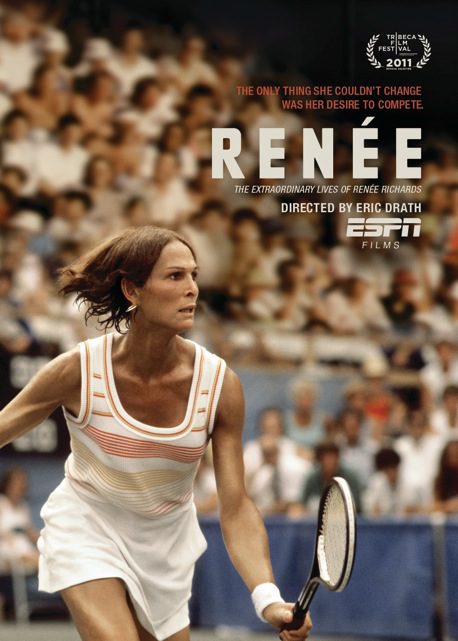With Wimbledon 2015 currently filling my days with tennis and all the attention Caitlyn Jenner has brought to the T in my queer community’s ever-expanding alphabet soup, this #FBF I harken back to the story of Renée Richards, as told by ESPN’s 30 for 30 documentary series in 2011 (available on Amazon Prime and iTunes). Renée Richards was quite the media sensation when she emerged onto the tennis tour in the 70s. She broke new ground for the transgender community by insisting that if she was a woman, she should be allowed to compete as one. The simplicity of that logic makes it obvious what the proper outcome should have been and eventually was. But the story of how and why Dr. Richard “Dick” Raskin, the seeming paragon of socially constructed masculinity, would live and compete as Renée Richards, a woman who had to fight to be recognized as a woman in all circles of her life, was where the complexity buried within that simple logic came out to play.
Renée (french for “reborn”), directed by Eric Drath, explores this fascinating life by asking a loaded question that appears at first to miss the point: “Can people really change who they are?” Through the course of this journey Drath learns that “She always remained the same person.” But even in asking the initial, seemingly wrong-headed question Drath gets right at the root of the many facets of Richards’ story, and highlights the unfair burdens an uncomprehending society places on transgender people. Dick Raskin could never fully suppress Renée, who lived inside even as he dominated the collegiate tennis circuit with his powerful serve and succeeded post-graduation as a world-class ophthalmologist. Renée is the woman Dick always saw himself as, determined by the femininity of the era in which Dick grew up, not the decade in which Renee physically changed (which also influenced how she played tennis, as opposed to how Dick played tennis). The world around Dick/Renée complicates the simplicity of the desire to lead an authentic life, as well as the lives of the immediate family, and the wife and child Dick has in attempting to conform to heteronormative standards. The media creates a freak show when Renée attempted to enter the draw of the US Open, and she becomes a celebrity from the notoriety of being the first transgender athlete to make this attempt. There was even a feature film starring Vanessa Redgrave (Second Serve) in addition to uncomfortably ignorant jokes by Johnny Carson and Bob Hope about playing mixed doubles with yourself.
It’s unfathomable to imagine competing with this level of pressure and questioning, from so many internal struggles and external forces (Is she really a woman? Won’t she have an unfair advantage? Can she still be a parent if her son remembers his father? etc). As former professional and longtime network tennis commentator Mary Carrillo says in the film, “She took a lot of arrows in her back and kept on going.” Martina Navratilova befriended her out of kinship, knowing what it was like as a gay athlete to be on the outside. Billie Jean King championed her efforts to play on the women’s tour when others were expressing their doubts. Renée was the guinea pig for transgender athletes to compete professionally, having to endure the indignity of inquiries into her gender and fighting in the courts of the law and of public opinion to be allowed to play. At the heart of everything, John McEnroe says it best when he remarks that there is a human being on the other end of all this intense scrutiny, that is trying to fulfill the life they were born to live. Renée still loved to play tennis, and was still the same excellent doctor as a woman, so why should she be, as her troubled son points out, stuck between “torment and happiness” for pursuing these same things now? The film covers a lot of ground in showing the life of a transgender person living through the cultural shifts and stigma through the decades. Even though it leaves some tantalizing threads dangling it also displays not just compassion, but an understanding of just how much Dr. Renée Richards accomplished for herself and future generations of people struggling with gender identity; not by setting out to be a hero, but by setting out to be herself.


